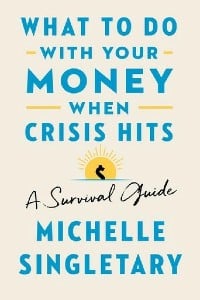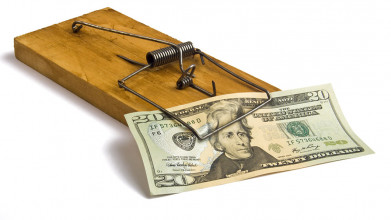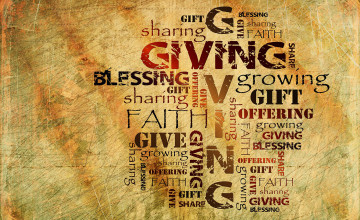
The War of Words
In this Adventures in Odyssey drama, a carelessly uttered word from Eugene creates havoc as it becomes the fashionable insult, resulting in a lesson about the power of words.
Home » Episodes » Focus on the Family Broadcast » Being Wise With Your Money During a Crisis (Part 1 of 2)
Preview:
Michelle Singletary: So, then you need to look at your budget and put in places where you can keep your money low. So, how much you spend for a car and things like that. And so you may have to skip a vacation a couple years while you stockpile savings for yourself. It’s all about looking at what’s important in your life, and funding that, and letting everything else go.
End of Preview
John Fuller: Today on Focus on the Family, you’ll hear from financial expert, Michelle Singletary. She’s gonna help you get a handle on your money. She has some great advice on managing finances, especially given all that’s going on in today’s world and economy. I’m John Fuller, and your host is Focus president and author, Jim Daly.
Jim Daly: John, I think it’s not just in the US here, but Canada and other countries, we’re going through a lot of financial turbulence-
John: Mm-hmm.
Jim: … I guess you would call it. Inflation, you know, we’re paying so much for gas and groceries and all of those kinds of things, and people hear about global recession and, you know, this is an issue. We’re coming out of Christmas, people probably put too much on credit cards, and it’s a perfect time to bring in a wonderful expert when it comes to how to manage your budget and how to create a budget and things like that. And we’re gonna talk to Michelle Singletary today, and she’s got great insights and a great book on how to better manage your dollars, especially in a crisis.
John: Right. And Michelle’s, uh, book is called What to Do with Your Money When Crisis Hits: A Survival Guide. Uh, we have copies of that here at the ministry, stop by focusonthefamily.com/broadcast, or call 800, the letter A and the word FAMILY, to get your copy. Uh, Michelle Singletary is a financial columnist for the Washington Post. She has a master’s degree in business and management, and she’s been here before and she’s always a popular guest.
Jim: Absolutely. Michelle, welcome back.
Michelle: Oh, thank you so much for having me.
Jim: Yeah, it’s… and you also went to Johns Hopkins, which is quite impressive-
Michelle: I did (laughs).
Jim: … for that master’s degree. That’s amazing.
Michelle: I did, yeah.
Jim: We had a board member, Ken, Dr. Ken Fentress, he went there as well.
Michelle: Yeah.
Jim: And he, uh, he did his PhD in dead languages (laughs).
Michelle: Oh wow.
Jim: Biblical dead languages (laughing). And Ken, if you’re listening, thank you for doing that (laughs). I’m sure it was an incredible journey.
John: Mm-hmm.
Jim: Uh, you heard that introduction, Michelle. Uh, there’s so much fear. If we watch too much news, I mean you can go to bed every night-
Michelle: Yeah.
Jim: … you know, opposite of what Jesus told us, right? Fear not.
John: Mm-hmm.
Michelle: Yeah.
Jim: And we could just get filled with fear because of what we see and hear. And we’ve got to be very cautious, especially in the Christian community, take, you know, all of this with a grain of salt ’cause we know the author and creator of our lives and our universe. That should give us some comfort, right?
Michelle: He does, that’s right.
Jim: But- but when you’re looking at it, um, you know, our- our dollars aren’t going as far as they used to. I think, uh, it’s 63% of people are living paycheck to paycheck.
Michelle: Yeah.
Jim: And when things go up, that- that’s a fear. Um, how do you first address that emotional issue of money?
Michelle: So, you know what I tell people? To- to lean in to, um, your… especially with your faith, right?
Jim: Yeah.
Michelle: Because we are taught to be faithful. But, um, scripture also talks to this, that faith without works is dead. So, you’ve got to look at both parts of it. You wanna use your faith, but there are things that you can do so that when we have times of crisis, you have something to fall back on. The problem is, um, during good times, we just think it’s never gonna end.
Jim: Mm-hmm.
Michelle: It’s always gonna be good. God doesn’t promise us good times all the time. He just says, “We’re gonna be… I’m gonna be there, but when you can, there’s some things that you should do that when those times come, you can lean on your faith, because you’ve done all the work.”
Jim: Yeah.
Michelle: So, that means saving when you have the money. That means not living above your means. Making better financial choices. Um, and that’s the kind of thing that both my husband and I teach. We have a program at our church, um, in the Maryland area, and that’s what we’ve been preparing people for.
Jim: Yeah.
Michelle: And I tell you, right before the pandemic, I was telling people, you know, “You’ve got to save, you’ve got to, you know, live more focused.” People were like, “Oh, things are going great,” and, you know, “What are you talking about?” And sure enough, here’s what hit, uh, and they weren’t prepared.
Jim: Yeah.
Michelle: And these are people who had the money, you know?
Jim: Yeah.
Michelle: There- there are different parts of America, right? We’ve got parts of America where people are just not making enough. They’re just making belo-… you know, minimum wage or below. And then there’s a good part of America that is doing okay, you know? But then they overspend. And of course there are people who, no matter what the economy does, they’re gonna be okay.
Jim: Yeah.
Michelle: They- they’ve got a lot of money.
Jim: It reminds me of that Joseph moment, right? Great story of the Old Testament-
John: Mm-hmm.
Michelle: Yes.
Jim: … where Joseph is in Egypt and he’s put in charge of everything, and he says, “Okay, we’re gonna save up.”
Michelle: That’s right.
Jim: “We need all the grain we can save up-
Michelle: Yeah.
Jim: … for a seven-year famine.”
Michelle: I love that story.
Jim: It’s a great story.
Michelle: I teach that story. It is… ’cause when we teach this story, it’s often like from, you know, prison to palace, you know, we kind of teach it that way. I think it’s a savings story.
Jim: Yeah, definitely (laughs).
Michelle: Right? Because when you think about it, his brothers would not have come to see him had it not been his… their father saying, “Hey, listen. They got extra up there.”
Jim: We need food.
Michelle: “We need food.”
Jim: Yeah.
Michelle: “Go get that extra.” And Joseph’s… during times of plenty, you know, the scripture says he saved so much that it was overflowing. So, he saved even past what they needed. Um, and then they reunited, trying to get more. And that story is all about when times are good-
Jim: Mm-hmm.
Michelle: … you save an abundance, not just for yourself, ’cause I really believe that your savings should be for your family and to help others.
Jim: Yeah.
Michelle: And that’s what he did, ’cause he would’ve had plenty just for Egypt, but he said, “No-
Jim: Yeah.
Michelle: … I’m gonna do more.” And I think that’s the message of that story, which I just love.
Jim: You know, Michelle, I hadn’t thought of this, but we have so many great donors to Focus on the Family that write incredible checks. You know, you sit there and go, “Wow, how can a person do that?” I’m just so grateful to them for doing exactly what you’re suggesting. The other awesome side of that is the joy in which they do it. You know, some people even put a smiley face on the check.
Michelle: (laughs).
Jim: Like a half a million dollar check and they put a smiley face on it-
Michelle: Oh, yeah.
Jim: … ’cause the Lord’s blesses them like that.
John: Mm-hmm.
Jim: It- it’s just so… man, it just is so refreshing to have a good attitude toward giving, whether it’s $20, $200, or $200,000, it doesn’t really matter.
Michelle: Yeah.
Jim: Let me ask you a real general question. In your… in your great book, What to Do with Your Money When Crisis Hits, uh, maybe a general question, what advice do you have for people that are hitting a financial calamity? What- what do they do first, other than maybe worry?
Michelle: Yeah. You know, w- worry’s a natural thing, but we’re not supposed to worry. But can I just be honest?
Jim: Yeah.
Michelle: I’m just gonna be completely honest, I’m a worrier.
Jim: (laughs).
Michelle: I know I shouldn’t be, I’m a woman of faith-
Jim: I appreciate that.
Michelle: … you know, but it’s just how I was raised. My grandmother was a worrier, she passed it onto me. Um, and so what I try to do is get people to… I don’t say, “Don’t panic,” because that’s just not where people live. So, I said, “You know what? It’s okay.” Ah! Like when the stock market is going down you’re just like, “Ah!” But you don’t wanna act on that panic. And so that’s what I say. Feel what you feel, ’cause you feel. You- you want to acknowledge the pain that people are going through.
Jim: Mm-hmm.
Michelle: And then you can come around and say, “These are the things that you need to do to get out of this predicament.”
Jim: Yeah.
Michelle: And that’s how I sort of approach it. And it’s also not a time to wag your finger at people.
Jim: No.
Michelle: You know, because this financial stuff is really, really tough.
Jim: Yeah.
Michelle: And it has nothing to do with your intelligence level. I have worked with doctors and lawyers and-
Jim: They just spend money
Michelle: … and they just spend mo-… And accountants.
Jim: (laughing).
Michelle: Can you believe it? Accountants.
Jim: That’s a good one.
Michelle: I was at church one time and we were… we had a little table, ’cause we were recruiting for our ministry, and a woman came up ahead of her husband with her baby in her arms. And she says, “Michelle, can you talk to my husband? He is really bad with money.” And I said, “Isn’t your husband an accountant?”
Jim: (laughs).
Michelle: And she said, “Yeah, that’s the problem. He thinks he knows everything.”
Jim: (laughs).
Michelle: “He handles his clients’ money perfectly-
Jim: Yeah.
Michelle: … but our money, he… it’s just, it’s a disaster.”
Jim: Mm-hmm. Right.
Michelle: And I said… That showed me that it has nothing to do with your intelligence level. Sometimes you’re overconfident, sometimes the men are a little overconfident (laughing), you know? Um, and- and so you… there’s a lot that you have to do to put in place for when a crisis hit. And that’s really what the book is about, that, you know, we are all… it’s not a matter of if there is gonna be another financial crisis. It’s when, right?
Jim: Yeah, and that’s fair. You mentioned your grandmother, and I do want people to hear that story, because, uh-
Michelle: Yeah.
Jim: … it’s a beautiful story. It- it’s what happens in families, and I experienced that myself. We didn’t have grandparents, but I ended up in foster care and other things. But you had your grandmother, which you called Big Momma.
Michelle: Big Momma, yeah.
Jim: So, tell us about Big Momma, and what happened and why- why you ended up there?
Michelle: Yeah. So, when, um, there was five of us. My sister was eight, I was four, a sister who was three, and twin brother just under, uh, two years old.
Jim: Mm-hmm.
Michelle: And our parents, you know, had some issues. And they basically abandoned us.
Jim: Mm-hmm.
Michelle: Um, they didn’t tell anyone we were in the house, and my grandmother, bless her heart, said she had a dream. I believe it’s probably the Lord talking to her.
Jim: I would think.
Michelle: And she said, “Something’s wrong.” He told her something’s wrong. She sent my grandfather over to check on us, a wellness check, and we were all in the house. There was no food in the refrigerator. He scooped us all up and took us to my grandmother’s house. And then of course the authorities got involved and they were gonna take us to foster care, because five grandchildren was a lot for her.
Jim: Sure.
Michelle: Um, and then she said, “You know what?” They wanted to split us up, and so she said, “I’m not gonna have that happen.” And so she said, “I’m gonna take all five of them.”
Jim: Mm-hmm. Yeah.
Michelle: It’s… I… every time I start, I can’t even ima-… I had three-
Jim: That’s a big heart.
Michelle: … and sometimes I don’t even want those three (laughs).
Jim: That’s a big heart.
Michelle: I mean for her to say I’m gonna take all five of them, most of us had health issues. My brother had epilepsy-
Jim: Mm-hmm.
Michelle: … um, uh, my sister had really bad asthma, I had arthritis, juvenile arthritis.
Jim: Wow.
Michelle: So, it’s just like a lot, right? And my grandfather who was a kind soul, had problems with alcohol.
Jim: Yeah.
Michelle: So, he, uh, sometimes would come home with his paycheck, sometimes not.
Jim: Mm-hmm.
Michelle: But no matter what, she paid every single bill on time. No matter what. She paid her mortgage off early.
Jim: Wow.
Michelle: I mean she… uh, the way she managed money was just miraculous, right?
Jim: Yeah.
Michelle: It was just-
Jim: I think I see where you got it.
Michelle: Yeah (laughs). I- I-
Jim: No, seriously. Wow.
Michelle: … learned everything at her feet. I absorbed everything from her. And she’s just the best money manager ever. I always joke that if she had a penny, Lincoln would scream.
Jim: (laughing).
Michelle: You know, and she… and the thing that I appreciate about my grandmother that I only just really started talking about, because now as a parent of, you know, young adults I get it. My grandmother never apologized for what she couldn’t get us. You know, some parents like, “Oh, I’m so sorry,” and they feel guilty, they overspend because they, you know, they give into all the materialism that is out there. And my grandmother, she said, “We don’t have it, and I’m not gonna get it, and I’m not gonna apologize for that. This is all that I can give you, and you need to be satisfied with that.”
Jim: Well, that’s good even having that discussion.
Michelle: That’s right.
Jim: You know, so many times parents will-
John: Mm-hmm.
Jim: … maybe live that way, that frugal way, but they don’t explain it.
Michelle: That’s right.
Jim: So, the kids don’t really have an opportunity to understand it.
Michelle: That’s right.
Jim: They just think they’re being deprived, right?
Michelle: That’s right.
Jim: Yeah.
Michelle: That’s right. Right. And- and, you know, and kids will be kids. They- they see their friends get stuff, um, but you’re right, she talked us through it all and I just remember thinking, “Okay, well, I can’t do anything about it.” And it’s so interesting, I just had a discussion with my adult daughters, ’cause I’ve- I’ve got this big birthday project coming in the Washington Post in January where I give advice for every decade. And so they’re in their 20s and we are, you know, we taped a podcast with them. And you know, the children don’t ever tell you that they’re… they’ve- they’ve listened to all the stuff, right?
Jim: Right (laughing).
Michelle: They’re just always fussing and rolling their eyes.
Jim: Yes.
Michelle: But when I… when we were discussing what it was like growing up under me, who is frugal like my grandmother, um, and I said, “Well, did I scar you?” And they just started laughing. They said, “You know, we didn’t like what you were saying, but now we understand.”
Jim: Right.
Michelle: ‘Cause I- I would have all these phrases that I would use. Like if they wanted to go out to a fast-food restaurant, it was like, “Do you have fast food money?” You know, “Do you have a job?” You know, and I would (laughs) like say things, you know, I would say, “College fund,” when they wanted to ask for stuff, because my husband and I send all three of them to college with no debt. And so when they would ask for things, we’d go, “Well, college fund.” And they just hated it. But now because they don’t have any debt and they can do things with their money and their life that they wouldn’t have been able to do, they said, you know, “We now appreciate those conversations, even though they were so annoying (laughing).”
Jim: Well, that’s good. You got them over that line.
Michelle: I got them over the line.
Jim: That’s pretty impressive. Um, the experience with your grandma helped you obviously to be frugal, and that is great. Um, I think you site a survey in the book that shows 53% of parents use credit cards or loans to pay for non-essential items.
Michelle: That’s right.
Jim: So, speak to that misuse, I guess you would categorize, with credit cards. What- what should we use credit cards for, and what should we not use credit cards for?
Michelle: Well, in America we have taught Americans to live the American dream on borrowed money. Don’t wait to save, just get it now.
Jim: That’s what the nation does too.
Michelle: That’s what the nation does.
Jim: 30 trillion.
Michelle: And so we teach them to not wait and- and- and if parents are in different situation, maybe they’ve been divorced, maybe they’re single parents, and there’s all this guilt of not being able to provide the materialistic things. I’m not talking about food and clothing and shelter. The extra stuff. And I get that. I understand that. But when we use credit that way and we can’t pay it off every month, you create this hole that is so hard to dig yourself out of, particularly when the credit card interest rates are so high now. They’re approaching 20%.
Jim: Yeah, it’s ridiculous.
Michelle: And some people have interest rates higher than that. And so we use credit to elevate our lifestyle, and then we get to the point where we can’t pay it. And then you can’t save for your retirement, you can’t save to send your kids to college, you can’t save when you lose a job, and everything becomes so tenuous. And so for my husband and I, even though we had the resources to give more, we wouldn’t.
And we use credit. I think you can use credit if you can pay it off the next month. It’s a convenient way not to have cash in your pocket-
Jim: Right.
Michelle: … but if you can’t pay that bill off the next month in full, then you shouldn’t be using that credit card.
Jim: You know, in that regard, again, the practical nature of this. I think in the book you talked about with your kids, but I guess you could do it too with yourself. Uh, you know, get a $500 cash card-
Michelle: Yeah.
Jim: … and that’s your grocery card for the week or for the month, whatever applies to you. Um, but you could find different ways to offset the, um, ease of a credit card-
Michelle: That’s right.
Jim: … without having to build up the debt of it.
Michelle: That’s right. So, credit is a convenience that they s-… they teach us that it’s our… it’s for our convenience. And so they… and now they have the point where you speed up the process of payments. So, now you can just tap your card. You know, I may be dating myself, but remember when they had to put out the machine-
John: Yes, yes.
Michelle: … and put the card in there-
Jim: Oh yeah.
Michelle: … and then swoosh, swoosh, swoosh sound, you know? And then sometimes they even had to go in the back and look for the machine. So, now you can tap your card and pay. You can pay by looking. They- they have, you know, open your phone and they can… you can pay.
Jim: Your face ID.
Michelle: … by just looking at the phone.
Jim: Yeah.
Michelle: And so when they decrease the time that it takes for you to pay, you tend to not think about how much you’re spending, becau-
Jim: Till you get that bill (laughs).
Michelle: … ’cause you get that bill, ’cause it’s so quick, you don’t have time to think about, “Can I afford this?” So, when you use cash or you use that pre-paid card, or even your debit card which only has so much on there, then you tend to take a pause, “Can I afford it?”
Jim: Mm-hmm.
Michelle: But when you use credit, you don’t ha-… take that pause.
Jim: It’s so funny, uh, d- dating myself, I remember-
Michelle: (laughs).
Jim: … I left my wallet in my car one time and it melted the numbers so the numbers-
Michelle: Oh (laughs).
Jim: … weren’t raised.
John: Oh my goodness.
Jim: So that when they ran it over the machine-
Michelle: They couldn’t do it.
Jim: … it wasn’t capturing the number.
Michelle: (laughs).
Jim: And I think it took one or two merchants. I didn’t know, I signed the slip and I was done, but one of them called me and said, “Uh, you need to come back to the store, ’cause your numbers didn’t come across (laughing).” So, it was all, uh, you know, unintentional. But, yeah, that dates me.
John: Mm-hmm. This is Focus on the Family with Michelle Singletary and Jim Daly, your host.
Jim: (laughs).
John: And, uh, we’re having a great conversation about things that matter of finances and how you can get a handle on yours. And, uh, we would certainly commend to you Michelle’s, uh, terrific book, What to Do with Your Money When Crisis Hits, and as we said earlier, even before crisis hits. Get a copy of the book from us here at the ministry, it’s focusonthefamily.com/broadcast, or call 800, the letter A, and the word FAMILY.
Jim: Michelle, I wanna go to a practical question, and probably Big Momma’s example is the way to do this. But there are certain things in your budget that are necessary. You need to pay your mortgage, pay your rent, you need to pay utilities, you need to buy groceries. So, when you’re looking at the must haves versus the- the wants, I mean the wants, we put a lot of s-… like a phone-
Michelle: Yeah.
Jim: … is not- not a necessity, and especially a big plan. So, describe for me in those- those basic terms if we’re really scratching in this economy and prices are going up, what do you we focus on to make sure we do have enough budget for the things we need?
Michelle: Right. So, the first thing, first is first, is giving. It must be at the top.
Jim: Huh.
Michelle: Now, it’s interesting, when you tell that to non-Christians they go, “Well, that doesn’t make any sense. If you’re in debt and you’ve got to pay all this, why would you do that? That should come last.” But I- I think the whole concept of tithing was God’s way to demand discipline in your finances.
Jim: Mm-hmm.
Michelle: Because if you have to carve out that first 10%, then you must be a better manager of the 90 that’s left. And if you only have 90, now you’re starting to figure out, “Well, what can I cut out?” So, housing, food, all that becomes important. And then you start looking at the things that are not a necessity. So, maybe you need a cellphone ’cause you wanna stay connected to your kids. Okay, whatever. I… my kids didn’t have phones until they were in high school, ’cause I figured where were they gonna be where there wasn’t an adult or somebody who had a phone (laughs)-
Jim: Right.
Michelle: … and they could borrow, right?
John: Yes, yes.
Jim: That’s good.
Michelle: And they were probably in their middle school, honestly, and I’m not exaggerating, they probably were the only kids who did not have a cellphone. And they fussed and I said, “I don’t care, ’cause we have a college fund to fund.”
Jim: Right (laughs).
Michelle: Um-
Jim: We’ve got one objective.
Michelle: We’ve got one objective. Um, and so then you start looking at the necessities, the other things that you have to do. And then you can add back in some ones.
Jim: Mm-hmm.
Michelle: And you will never hear me tell people to not get like that expensive coffee. If that… I’m not a coffee drinker, I like tea, um, you know, less… much less expensive.
Jim: (laughs).
Michelle: But if that coffee sets you in the mood for the day, you know, that good cup of java, and you’re going into work and you have a sense of calmness, I’m okay with that. Because that- that’s something that is important to you, because you know if you work at a crazy place, not here (laughing), but I, you know, work at a very high intense place. I am okay with that, because that cup of coffee is not what’s keeping you from being a millionaire. It’s not what’s keeping you from buying that home. That expense is too little. The big things, how much you spend for that car, getting that car note-
Jim: Mm-hmm.
Michelle: … that’s five or six or seven years. If you need a car note that is more than 48 months, four years, you cannot afford that car.
Jim: Hah.
Michelle: And so then you need to look at your budget and put in places where you can keep your money low. So, how much you spend for a car and things like that. And so you may have to skip a vacations a couple of years while you stockpile savings for yourself.
Jim: Right.
Michelle: It’s all about looking at what’s important in your life and funding that and let everything else go.
Jim: Yeah. And, again, good advice. It really requires some discipline-
Michelle: That’s right.
Jim: … and that can be the- the Achilles’ heel for people, right? Just to stay disciplined, not perfect-
Michelle: Right.
Jim: … it’s kind of like parenting, right (laughs)?
Michelle: Yeah.
Jim: You don’t have to be perfect, but you need to be in the good space, and that’s part of what you’re talking about with budgeting. In addition to that, you recommend three areas of triage when people are struggling financially. So, let’s hit those, and particularly when you’re unemployed or under unemployed.
Michelle: Yeah.
Jim: What were those three?
Michelle: So, when… I- I got this idea, when you go to the hospital to the emergency room, and I’ve been there, you know, so a kid breaks an arm or something, and you see someone come in and they go ahead of you. And you’re thinking, “Well, wait a minute, I’ve been sitting here for hours.” And so what they’re doing is they’re triaging who is the most important life-threatening. And so that’s what you have to do with your life. So, you have to… what needs to be taken care of right away? Emergency fund. Life happens fund. That’s something I talk about in the book. And then your savings for different things, like your daily expenses, and then the long-term things like retirement and things like that. So, you have to… ’cause you only have a certain amount of money coming in, and that’s what you need to do. What is the most important thing that you have to take care of? And then you go to the- the- the daily stuff. And then that’s when the wants and the other things come in.
Jim: And in that regard, uh, that triage, uh, when you have debt, you kind of got to look at it and what’s the highest interest, try to pay that off. That’s what I’ve heard from other financial folks. Do you agree with that? Do you kind of look at it? What’s your attack methodology?
John: Mm-hmm.
Michelle: Yeah, I don’t agree with that (laughs).
Jim: Yeah, that’s all right.
Michelle: I’m a little different than a lot of financial experts, because they’re looking at the math. And it does make more sense. You- you line up your debt with the one with the most expensive interest rate. Works on paper. But we know that what works on paper often doesn’t work in practice.
Jim: Right.
Michelle: And so what I found in the ministry that I run at my church is that when people list their debts from the smallest to the largest, ignoring the interest rate, um, you attack that first debt-
Jim: Get a win.
Michelle: … the smallest, you get a win.
Jim: Yeah.
Michelle: And people feel like, “Oh, I’ve now reduced my debt so quickly, I can go to the next one,” and then the next one. And I’ve done this year after year and what I found is that when people get those quick wins, they become more energized to get rid of the debt, and they actually get rid of it sooner. And there have been studies that show that, that this method, small to the largest, actually works ’cause it’s more psychological.
Jim: Yeah.
Michelle: Because the- the money issue, you know, oftentimes people don’t have a money issue, they have a management, a mental issue, right? And my husband and I, when we knew that we wanted to have kids, one of the things we said is that we don’t want them to have the weight of debt, because debt limits your choices.
Jim: Mm-hmm.
Michelle: Two of my kids are in professions that don’t make a lot of money by our standards, right? One is a therapist, a social worker, the other is a kindergarten teacher, right.
Jim: Oh, that’s sweet (laughs).
Michelle: She’s going to earn some good money, but not- not the money a lawyer or a doctor might, right?
Jim: Yeah, you’ve got to manage it.
Michelle: But you’ve got to manage it.
Jim: Yeah.
Michelle: But my daughter can be a teacher, that is her God gift to be a teacher. She… I call her the kid whisperer.
Jim: Yeah.
Michelle: She’ll walk in a room and I don’t care how a-… they all kind of migrate to her.
Jim: Wow.
Michelle: She has that spirit. But what happens when people say they wanna be a teacher? What’s the first thing people say?
Jim: Yeah, we all say, “Well, you may not be able to make a living doing that.
Michelle: Right.
Jim: Yeah.
Michelle: But my goodness, you wouldn’t be sitting here, you wouldn’t be sitting here, I wouldn’t be sitting here if not for the fact of educators, right?
Jim: Sure.
Michelle: Educators pushed me to do what I do. I remember in- in high school, the high school counselor, there was a- a full scholarship and she said, “You ought to apply for this.” It was a Johnston scholarship. And I said, “I’m not gonna do it. They’re not gonna give it to me. Who are they… I’m- I’m this little kid who was- was tossed out by her parents, raised by her grandmother, her grandfather was an alcoholic, they’re not gonna give this to me.” She said, “Apply anyway, ’cause you already have a no,” right?
Jim: Yeah, wow.
Michelle: S- so, and I applied and I got it. Had it not been for her believing in me before I believed in me-
Jim: Mm-hmm. Yeah.
Michelle: … I wouldn’t be sitting in this chair today. So, I would not want to deprive my daughter of that career, so I teach her how to handle… my husband and I teach her how to handle her money so that she could be a teacher. And maybe you were gifted to be a bus driver (laughs), or maybe you were gifted to be in a career that isn’t gonna earn what we Americans think is, you know, what you should be earning. But if we teach people to handle money well, they, for the most part, can live in whatever God has gifted them to be f-… as a career.
Jim: Yeah.
Michelle: And so we never told her, we… it never came out of our mouths, “You’re never gonna earn much as a teacher. Don’t you wanna be an administrator or don’t you wanna be this (laughs)?” We said, “Go ahead and be that teacher.” And now she calls her children my children (laughing), you know? And I just love that.
Jim: Well, and it shows you the power of being free to do the things you’re called to do.
Michelle: That’s right. That’s right.
Jim: And you’re not anchored by the debt that’s created ’cause you’re living beyond your means.
Michelle: That’s right.
Jim: And sometimes that’s really hard, but man, you- you illustrate such incredible discipline, you and your husband, and that’s what makes it so worthwhile, your book, What to Do with Your Money When Crisis Hits. I mean it is a manual-
Michelle: Yeah.
Jim: … on taking care of this. And it’s not impossible.
Michelle: It’s not.
Jim: I love that statement your friend said, you know, you already know no-
Michelle: (laughs) exactly.
Jim: … so why not try yes? I mean and so getting disciplined and doing the right things, paying debt down et cetera. Uh, Michelle, let’s come back next time, cover more great tools, uh, to manage your money in a way that honors the Lord, first and foremost, and then helps position you to be able to give and do the things that God’s calling you to do. Can we do that?
Michelle: Yes, of course.
Jim: Let’s do it. And, listen, we wanna get this book into your hands. If you can participate in ministry and make a monthly gift or a one-time gift, we’ll send it as our way of saying thank you for being part of the ministry. We don’t pay shareholders, there’s no profit earned at Focus, so it all goes back into ministry, which is great. If you can’t afford it, obviously we’re a Christian ministry, we’ll give it to you, and we’ll get it into your hands and we’ll trust others will cover the cost of doing so. It’s probably one of the most important things you could do, is get your finances in order-
John: Mm-hmm.
Jim: … so you can bless others and bless ministries in order to do the- the work that God’s called you together to do. So, do it. Uh, get in touch with us, no matter what your circumstances, and we’ll bless you with this great resource.
John: Donate as you can, uh, a monthly pledge would certainly be appreciated, or a one-time gift, either way, make a donation today when you call 800, the letter A, and the word FAMILY, or stop by focusonthefamily.com/broadcast. On behalf of Jim Daly and the entire team, thanks for joining us today for Focus on the Family. I’m John Fuller inviting you back as we continue the conversation with Michelle, and once again, help you and your family thrive in Christ.

Michelle Singletary is a nationally recognized finance expert and a syndicated columnist for The Washington Post. Her award-winning column “The Color of Money” is carried in dozens of newspapers across the nation and was nominated for a Pulitzer Prize. Michelle has made guest appearances on many television shows including NBC’s Today Show, CBS’ The Early Show and ABC’s The View. She has authored three books: The 21 Day Financial Fast, Spend Well, Live Rich and Your Money and Your Man. Michelle and her husband have three children and reside in Maryland. Learn more about Michelle by visiting her website, michellesingletary.com.

Receive the book What To Do With Your Money When a Crisis Hits for our donation of any amount! Plus, receive member-exclusive benefits when you make a recurring gift today. Your monthly support helps families thrive.

Visit our online store and purchase a CD of today's program for yourself or to share with a friend.

Poor financial communication between husband and wife is common. Talking about money doesn't always come naturally, but Bethany and Scott Palmer offer tips that can make the process a little easier.

Are you falling into a financial trap? You may be losing money where you least expect it. See if you can escape these common money mistakes.

If your money situation has reached the point where you find yourself sweating the arrival of each new batch of bills — if you’re habitually operating in the red and lying awake nights wondering how you’re going to make ends meet — there’s no time like the present to take things firmly in hand.

Divorced couples have revealed that money is one of the main reasons for their breakups.

During my years in seminary, money came in fairly infrequently. My wife, Lois, stayed home with our children, and I worked occasional jobs around my studies.

If God gave out advice about money would you listen? Here are a few ideas you may want to add to your tip sheet.

There are many misunderstandings about scriptural teaching on debt. People often assume that the Bible takes certain positions when it really doesn’t. So let’s take a look at what the Bible doesn’t say — and what it does say.

Doubt about the future strikes every new widow and widower at a time when their security has been greatly shaken. Many fears and questions arise. Whether or not you’ll be able to live as well in the future is determined by three things: your income, expenses, and long-term needs.

In this Adventures in Odyssey drama, a carelessly uttered word from Eugene creates havoc as it becomes the fashionable insult, resulting in a lesson about the power of words.

This discussion offers a preview of Volume #16 “Cultures in Conflict” from the That The World May Know video series, available below.

Debra Fileta will help couples better understand the four seasons of healthy relationships, what to expect during each one, and how to carefully navigate them for a stronger marriage. (Part 1 of 2)

Larnelle Harris shares stories about how God redeemed the dysfunctional past of his parents, the many African-American teachers who sacrificed their time and energy to give young men like himself a better future, and how his faithfulness to godly principles gave him greater opportunities and career success than anything else.

Amy Carroll shares how her perfectionism led to her being discontent in her marriage for over a decade, how she learned to find value in who Christ is, not in what she does, and practical ways everyone can accept the messiness of marriage and of life.

Jonathan McKee offers parents practical advice and encouragement in a discussion based on his book If I Had a Parenting Do Over: 7 Vital Changes I’d Make.